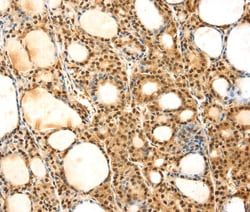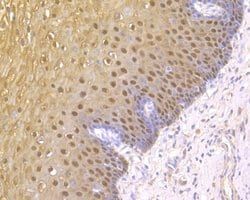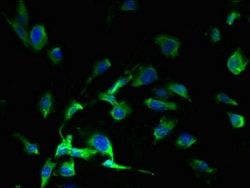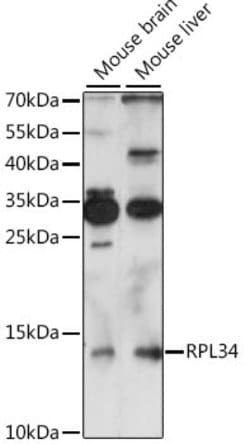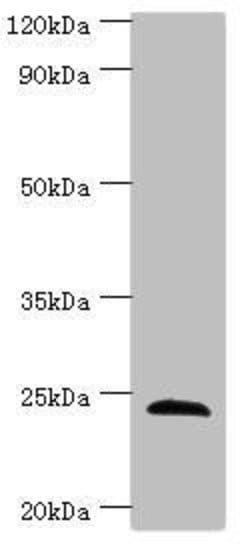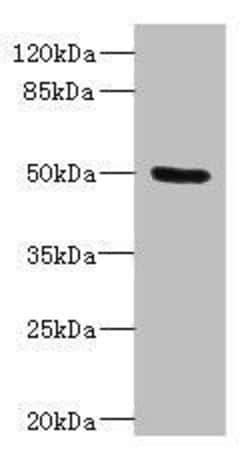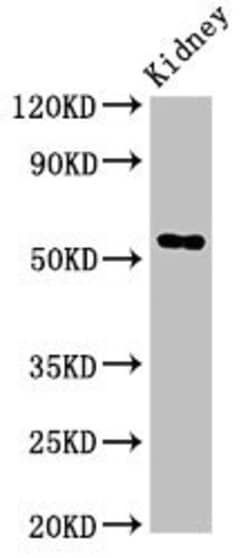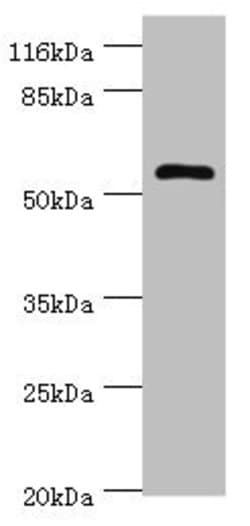PIPA5113315
Sclerostin Polyclonal Antibody, Invitrogen™
Manufacturer: Thermo Scientific
Select a Size
| Pack Size | SKU | Availability | Price |
|---|---|---|---|
| Each of 1 | PIPA5113315-Each-of-1 | In Stock | ₹ 43,476.50 |
PIPA5113315 - Each of 1
In Stock
Quantity
1
Base Price: ₹ 43,476.50
GST (18%): ₹ 7,825.77
Total Price: ₹ 51,302.27
Antigen
Sclerostin
Classification
Polyclonal
Conjugate
Unconjugated
Gene
SOST
Gene Alias
5430411E23Rik; CDD; DAND6; sclerosteosis; sclerostin; SOST; SOST1; UNQ2976/PRO7455/PRO7476; VBCH
Host Species
Rabbit
Purification Method
Antigen affinity chromatography
Regulatory Status
RUO
Gene ID (Entrez)
50964
Content And Storage
-20°C or -80°C if preferred
Form
Liquid
Applications
ELISA, Immunohistochemistry (Paraffin), Western Blot
Concentration
0.55 mg/mL
Formulation
PBS with 50% glycerol and 0.02% sodium azide; pH 7.3
Gene Accession No.
Q9BQB4
Gene Symbols
SOST
Immunogen
Recombinant Human Sclerostin protein (24-213AA)
Quantity
100 μL
Primary or Secondary
Primary
Target Species
Human
Product Type
Antibody
Isotype
IgG
Description
- Sclerostin, a glycoprotein predominantly secreted by osteocytes, is a member of the Cerberus/DAN family of putative BMP antagonists that functions as an endogenous regulator of the canonical Wnt signaling pathway and an inhibitory regulator of bone homeostasis
- Although expressed nearly exclusively by osteocytes, sclerostin can also be found at significant levels elsewhere, such as bone, bone marrow, cartilage, the kidney, and the liver, and has also been shown to be produced by hypertrophic chondrocytes and cementocytes
- Like DKK family members DKK-1 and DKK-4, sclerostin plays an important regulatory role in the Wnt/beta-catenin signaling pathway by forming inhibitory complexes with LDL Receptor-related proteins 5 and 6 (LRP5 and LRP6), which are essential components of the Wnt/beta-catenin signaling system
- LRP5 and LRP6 are single-pass transmembrane proteins that appear to act as co-receptors for Wnt ligands involved in the Wnt/beta-catenin signaling cascade
- Sclerostin has also been shown to interact directly with LRP4 via its extracellular domain to facilitate inhibition of Wnt signaling, and can catabolically promote osteoclast activity by increasing osteocyte expression of RANKL
- Sclerostin's critical involvement in the regulation of bone formation and resorption is emphasized by two bone dysplasia disorders, sclerosteosis and van Buchem disease (VBD), caused by rare autosomal recessive mutations that result in progressive bone overgrowth and hypermineralization due to markedly decreased sclerostin levels.
Compare Similar Items
Show Difference
Antigen: Sclerostin
Classification: Polyclonal
Conjugate: Unconjugated
Gene: SOST
Gene Alias: 5430411E23Rik; CDD; DAND6; sclerosteosis; sclerostin; SOST; SOST1; UNQ2976/PRO7455/PRO7476; VBCH
Host Species: Rabbit
Purification Method: Antigen affinity chromatography
Regulatory Status: RUO
Gene ID (Entrez): 50964
Content And Storage: -20°C or -80°C if preferred
Form: Liquid
Applications: ELISA, Immunohistochemistry (Paraffin), Western Blot
Concentration: 0.55 mg/mL
Formulation: PBS with 50% glycerol and 0.02% sodium azide; pH 7.3
Gene Accession No.: Q9BQB4
Gene Symbols: SOST
Immunogen: Recombinant Human Sclerostin protein (24-213AA)
Quantity: 100 μL
Primary or Secondary: Primary
Target Species: Human
Product Type: Antibody
Isotype: IgG
Antigen:
Sclerostin
Classification:
Polyclonal
Conjugate:
Unconjugated
Gene:
SOST
Gene Alias:
5430411E23Rik; CDD; DAND6; sclerosteosis; sclerostin; SOST; SOST1; UNQ2976/PRO7455/PRO7476; VBCH
Host Species:
Rabbit
Purification Method:
Antigen affinity chromatography
Regulatory Status:
RUO
Gene ID (Entrez):
50964
Content And Storage:
-20°C or -80°C if preferred
Form:
Liquid
Applications:
ELISA, Immunohistochemistry (Paraffin), Western Blot
Concentration:
0.55 mg/mL
Formulation:
PBS with 50% glycerol and 0.02% sodium azide; pH 7.3
Gene Accession No.:
Q9BQB4
Gene Symbols:
SOST
Immunogen:
Recombinant Human Sclerostin protein (24-213AA)
Quantity:
100 μL
Primary or Secondary:
Primary
Target Species:
Human
Product Type:
Antibody
Isotype:
IgG
Antigen: PTPN18
Classification: Polyclonal
Conjugate: Unconjugated
Gene: PTPN18
Gene Alias: BDP1; Brain-derived phosphatase; fetal liver phosphatase 1; FLP1; FLP-1; HSCF; protein tyrosine phosphatase 20; protein tyrosine phosphatase, non-receptor type 18; protein tyrosine phosphatase, non-receptor type 18 (brain-derived); PTP20; PTP-HSCF; Ptpk1; PTP-K1; Ptpn18; Tyrosine-protein phosphatase non-receptor type 18
Host Species: Rabbit
Purification Method: Antigen affinity chromatography
Regulatory Status: RUO
Gene ID (Entrez): 26469, 301333
Content And Storage: -20°C or -80°C if preferred
Form: Liquid
Applications: ELISA, Immunohistochemistry (Paraffin), Western Blot
Concentration: 0.7 mg/mL
Formulation: PBS with 50% glycerol and 0.02% sodium azide; pH 7.3
Gene Accession No.: Q99952
Gene Symbols: PTPN18
Immunogen: Recombinant Human Tyrosine-protein phosphatase non-receptor type 18 protein (1-210AA)
Quantity: 100 μL
Primary or Secondary: Primary
Target Species: Human, Rat
Product Type: Antibody
Isotype: IgG
Antigen:
PTPN18
Classification:
Polyclonal
Conjugate:
Unconjugated
Gene:
PTPN18
Gene Alias:
BDP1; Brain-derived phosphatase; fetal liver phosphatase 1; FLP1; FLP-1; HSCF; protein tyrosine phosphatase 20; protein tyrosine phosphatase, non-receptor type 18; protein tyrosine phosphatase, non-receptor type 18 (brain-derived); PTP20; PTP-HSCF; Ptpk1; PTP-K1; Ptpn18; Tyrosine-protein phosphatase non-receptor type 18
Host Species:
Rabbit
Purification Method:
Antigen affinity chromatography
Regulatory Status:
RUO
Gene ID (Entrez):
26469, 301333
Content And Storage:
-20°C or -80°C if preferred
Form:
Liquid
Applications:
ELISA, Immunohistochemistry (Paraffin), Western Blot
Concentration:
0.7 mg/mL
Formulation:
PBS with 50% glycerol and 0.02% sodium azide; pH 7.3
Gene Accession No.:
Q99952
Gene Symbols:
PTPN18
Immunogen:
Recombinant Human Tyrosine-protein phosphatase non-receptor type 18 protein (1-210AA)
Quantity:
100 μL
Primary or Secondary:
Primary
Target Species:
Human, Rat
Product Type:
Antibody
Isotype:
IgG
Antigen: FUCA1
Classification: Polyclonal
Conjugate: Unconjugated
Gene: Fuca1
Gene Alias: 0610006A03Rik; 9530055J05Rik; A L fucosidase I; A L fucoside fucohydrolase 1; Afuc; alpha-L-fucosidase; alpha-L-fucosidase 1; Alpha-L-fucosidase I; alpha-L-fucoside fucohydrolase 1; EC 3.2.1; EC 3.2.1.51; Fuca; Fuca1; Fucosidase alpha-L-1 tissue; fucosidase, alpha-L- 1, tissue; Fucosidase, alpha-L-1, tissue; MGC137270 protein; Nbla10230; Tissue alpha-L-fucosidase; Tissue a L fucosidase; a L fucosidase 1; a L fucosidase I; a L fucoside fucohydrolase 1
Host Species: Rabbit
Purification Method: Protein G
Regulatory Status: RUO
Gene ID (Entrez): 24375, 71665
Content And Storage: -20°C or -80°C if preferred
Form: Liquid
Applications: ELISA, Western Blot
Concentration: 3.4 mg/mL
Formulation: PBS with 50% glycerol and 0.03% ProClin 300; pH 7.4
Gene Accession No.: P17164, Q99LJ1
Gene Symbols: Fuca1
Immunogen: Recombinant Mouse Tissue alpha-L-fucosidase protein (18-452AA)
Quantity: 100 μg
Primary or Secondary: Primary
Target Species: Mouse, Rat
Product Type: Antibody
Isotype: IgG
Antigen:
FUCA1
Classification:
Polyclonal
Conjugate:
Unconjugated
Gene:
Fuca1
Gene Alias:
0610006A03Rik; 9530055J05Rik; A L fucosidase I; A L fucoside fucohydrolase 1; Afuc; alpha-L-fucosidase; alpha-L-fucosidase 1; Alpha-L-fucosidase I; alpha-L-fucoside fucohydrolase 1; EC 3.2.1; EC 3.2.1.51; Fuca; Fuca1; Fucosidase alpha-L-1 tissue; fucosidase, alpha-L- 1, tissue; Fucosidase, alpha-L-1, tissue; MGC137270 protein; Nbla10230; Tissue alpha-L-fucosidase; Tissue a L fucosidase; a L fucosidase 1; a L fucosidase I; a L fucoside fucohydrolase 1
Host Species:
Rabbit
Purification Method:
Protein G
Regulatory Status:
RUO
Gene ID (Entrez):
24375, 71665
Content And Storage:
-20°C or -80°C if preferred
Form:
Liquid
Applications:
ELISA, Western Blot
Concentration:
3.4 mg/mL
Formulation:
PBS with 50% glycerol and 0.03% ProClin 300; pH 7.4
Gene Accession No.:
P17164, Q99LJ1
Gene Symbols:
Fuca1
Immunogen:
Recombinant Mouse Tissue alpha-L-fucosidase protein (18-452AA)
Quantity:
100 μg
Primary or Secondary:
Primary
Target Species:
Mouse, Rat
Product Type:
Antibody
Isotype:
IgG
Antigen: DPH2
Classification: Polyclonal
Conjugate: Unconjugated
Gene: DPH2
Gene Alias: 2-(3-amino-3-carboxypropyl)histidine synthase subunit 2; 9130020C19Rik; AI467389; diphthamide biosynthesis 2; diphthamide biosynthesis protein 2; diphthamide biosynthesis protein 2 homolog-like 2; diphthamide biosynthesis-like protein 2; Diphtheria toxin resistance protein 2; diptheria toxin resistance protein required for diphthamide biosynthesis (Saccharomyces)-like 1; diptheria toxin resistance protein required for diphthamide biosynthesis (Saccharomyces)-like 2; diptheria toxin resistance protein required for diphthamide biosynthesis-like 2; DPH2; DPH2 homolog; DPH2 homolog (S. cerevisiae); DPH2L2; DPH2-like 2; EGK_00671; MmDph2; S-adenosyl-L-methionine:L-histidine 3-amino-3-carboxypropyltransferase 2; S-adenosyl-L-methionine:L-histidine 3-amino-3-carboxypropyltransferase DPH2
Host Species: Rabbit
Purification Method: Protein G
Regulatory Status: RUO
Gene ID (Entrez): 1802, 67728
Content And Storage: -20°C or -80°C if preferred
Form: Liquid
Applications: ELISA, Immunohistochemistry (Paraffin), Western Blot
Concentration: 3 mg/mL
Formulation: PBS with 50% glycerol and 0.03% ProClin 300; pH 7.4
Gene Accession No.: Q9BQC3, Q9CR25
Gene Symbols: DPH2
Immunogen: Recombinant Human 2-(3-amino-3-carboxypropyl)histidine synthase subunit 2 protein (1-489AA)
Quantity: 100 μg
Primary or Secondary: Primary
Target Species: Human, Mouse
Product Type: Antibody
Isotype: IgG
Antigen:
DPH2
Classification:
Polyclonal
Conjugate:
Unconjugated
Gene:
DPH2
Gene Alias:
2-(3-amino-3-carboxypropyl)histidine synthase subunit 2; 9130020C19Rik; AI467389; diphthamide biosynthesis 2; diphthamide biosynthesis protein 2; diphthamide biosynthesis protein 2 homolog-like 2; diphthamide biosynthesis-like protein 2; Diphtheria toxin resistance protein 2; diptheria toxin resistance protein required for diphthamide biosynthesis (Saccharomyces)-like 1; diptheria toxin resistance protein required for diphthamide biosynthesis (Saccharomyces)-like 2; diptheria toxin resistance protein required for diphthamide biosynthesis-like 2; DPH2; DPH2 homolog; DPH2 homolog (S. cerevisiae); DPH2L2; DPH2-like 2; EGK_00671; MmDph2; S-adenosyl-L-methionine:L-histidine 3-amino-3-carboxypropyltransferase 2; S-adenosyl-L-methionine:L-histidine 3-amino-3-carboxypropyltransferase DPH2
Host Species:
Rabbit
Purification Method:
Protein G
Regulatory Status:
RUO
Gene ID (Entrez):
1802, 67728
Content And Storage:
-20°C or -80°C if preferred
Form:
Liquid
Applications:
ELISA, Immunohistochemistry (Paraffin), Western Blot
Concentration:
3 mg/mL
Formulation:
PBS with 50% glycerol and 0.03% ProClin 300; pH 7.4
Gene Accession No.:
Q9BQC3, Q9CR25
Gene Symbols:
DPH2
Immunogen:
Recombinant Human 2-(3-amino-3-carboxypropyl)histidine synthase subunit 2 protein (1-489AA)
Quantity:
100 μg
Primary or Secondary:
Primary
Target Species:
Human, Mouse
Product Type:
Antibody
Isotype:
IgG
